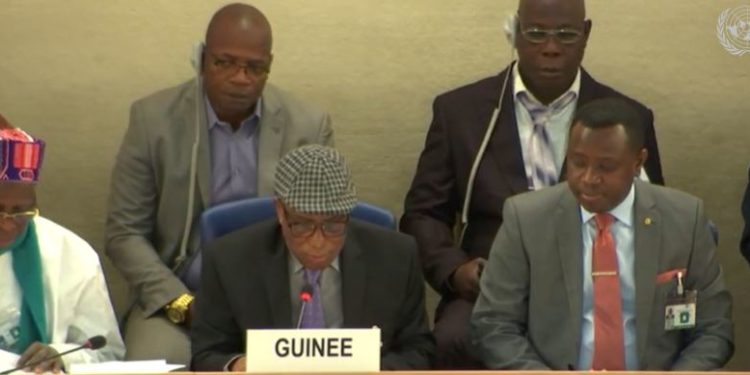By Susan Kendi
For over a decade, the victims and families of those raped and massacred in the stadium in Conakry, Guinea have never received justice. June 2020 begins of the long-delayed trial to bring perpetrators to account.
During the country’s third universal periodic review held in Geneva on January 21,2020, Guinea’s Justice Minister Mohamed Lamine Fofana, said that the Court that is under construction is to be completes by May 2020 and hearings begin in June. The move was welcomed by the International Criminal Court’s prosecutor, Fatou Bensouda during her speech on the situation in Guinea.
“Construction of the new courtroom in Conakry is an important step towards holding long-awaited trial and to see justice done,” said Bensouda.
Guinea’s Justice Minister has also affirmed of the government’s support to ensure that the alleged perpetrators are held to account for the crimes they committed. The country’s universal periodic reviews have held in May 2010, January 2015 and January 2020 respectively.
September 28, 2009 is a date that ignites shivers and re-opens wounds since many Guineans paid a high cost for championing for democracy in their country. More than 150 people died, at least 109 women raped and more than 1,000 injured after the police opened fire and indiscriminately shot at peaceful demonstrators and raped women who had assembled at the stadium to protest Captain Moussa Dadis Camara plans to run for presidential elections in 2010 and calling for transparent elections in Guinea.
An investigation was launched in February 8, 2010 when a domestic panel of judges were appointed to investigate the crimes committed. The investigation concluded 7 years later, after which they charged a former Guinean military leader, Abubakar “Toumba” Diakite and Guinea’s ex-president Moussa “Dadis” Camara for their alleged role in the rapes and massacre committed at the stadium. The slow progress of the investigation was blamed on to political, financial and logistical challenges.
The Former Justice Minister Cheick Sako organised a steering committee in April 2018 to ensure that matters regarding the trial are organised.
In a report dated September 25, 2019 Amnesty International disclosed that the steering committee organised by the former Justice Minister Cheick Sako in April 2018 was supposed to meet weekly but has only met “intermittently.”
The report added that the presiding and sitting judges have not yet been appointed irrespective of the fact that the country’s Supreme Court had rejected appeals with relation to the end of the investigation. The trial date is yet to be scheduled.
According to Human Rights Watch, the Judges have heard the testimonies of over 400 victims and family members and also questioned witnesses who include members of the security services.
There are several pitfalls identified by human rights organisations apart from the Amnesty report outlined above. Here are some findings that raise eyebrows on whether the Government of Guinea will honour their commitment to ensure victims get justice.
In a 10-day investigation into the September 28, 2009 killings and rapes, Human Rights Watch refuted the Guinea’s government claims that the massacre was “accidental.”
The organisation found new evidence that the massacre and widespread sexual violence was organised.
The evidence which entail accounts from confidential military sources and medical personnel revealed that “the military engaged in a systematic effort to hide the evidence of their crimes and misrepresent the number killed during the events of September 28.”
According to the report the forces in Guinea tried to cover evidence by seizing bodies from the stadium and city’s morgues and burying them in undisclosed mass graves.
“The serious abuses carried out in Guinea on September 28 were clearly not the actions of a group of rogue, undisciplined soldiers, as the Guinean government contends… They were premeditated, and top-level leaders must at the very least have been aware of what was being planned, our investigation shows,” said Emergencies director at Human Rights Watch, Peter Bouckaert.
As victims await justice, the country is on fire. The government has been clamping down on protests resisting a new constitution which paves way for the incumbent president Alpha Conde to run for presidency in the coming elections scheduled for September this year.The president has not responded to the allegations that he wants to run for a third term.
At least 17 people are said to have lost their lives, six civil society activists and several journalists arrested and detained during the protests that took place in October and November 2019.
Guinea is one of the countries under investigation at the International Criminal Court.
References:
Amnesty international report:
https://www.amnesty.org/en/latest/news/2019/09/guinea-a-decade-later-no-justice-for-massacre/
Guinea’s timeline:
https://www.hrw.org/video-photos/interactive/2019/09/25/guinea-timeline
Human Rights Watch reports:
https://www.hrw.org/news/2020/01/22/guinea-support-2009-massacre-trial-unequivocal
https://www.hrw.org/news/2009/10/27/guinea-september-28-massacre-was-premeditated
https://www.hrw.org/news/2016/09/27/guinea-7-years-justice-massacre-needed
Statement by the ICC Prosecutor (Fatou Bensouda) on the situation in Guinea:
https://www.icc-cpi.int/Pages/item.aspx?name=200123-otp-statement-guinea







